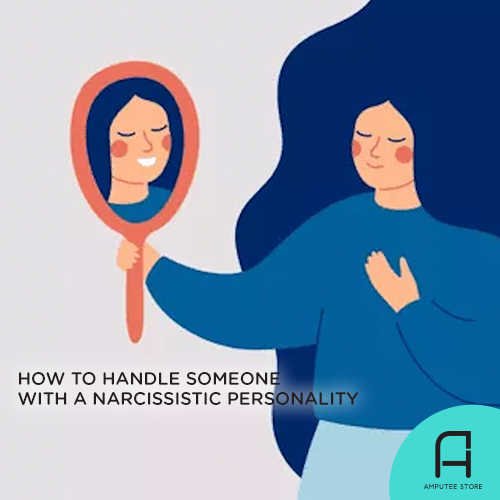How to Handle Someone With A Narcissistic Personality
The word ‘narcissist’ is often used to describe someone self-centered and lacking in empathy. However, Narcissistic Personality Disorder (NPD) is a legitimate mental health condition that can make relationships challenging for the person living with the condition. Likewise, it can make it harder for others to maintain a relationship with the person.

However, some individuals can display traits associated with narcissism, even if they haven’t been diagnosed with NPD. These characteristics may include having an inflated perception of their own importance, creating an imaginary world to enhance their sense of grandiosity, seeking constant admiration and praise, feeling entitled to special treatment, exploiting or taking advantage of others without remorse, lacking empathy or concern for others’ needs, bullying or belittling others, and dominating conversations or meetings.
Furthermore, people with NPD or narcissistic tendencies get very sensitive to feedback from others and even react with fury if confronted. They can also become cross if they feel ignored or slighted.
Dealing with people with NPD or narcissistic traits may feel like walking on eggshells, but you don’t have to put your mental and physical health on the line for the other person. Here’s a look at some ways to deal with someone who has narcissistic tendencies and learn how to look out for yourself.
Set clear boundaries
Successful relationships often have clear boundaries. When dealing with someone with narcissistic tendencies, clear boundaries are even more critical, as they will often cross those lines.
Enforce these boundaries rather than making idle threats or ultimatums. This will force the other person to take you seriously.
Cultivate your self-esteem
Enforcing clear boundaries is often difficult for people with low self-esteem, so building your self-esteem is necessary.
Having a healthy level of self-esteem is crucial in dealing with the challenging behaviors that may arise. To boost your self-esteem, it’s important to engage in positive self-talk, prioritize self-care, and surround yourself with a supportive network of people. By developing resilience through these practices, you can better navigate the difficulties that come with interacting with someone who exhibits narcissistic behaviors.
Learn how to keep calm
People with NPD or narcissistic traits can be volatile and sensitive in arguments or confrontations. So, learning to keep calm and keep the situation from blowing up is essential.
You can start practicing skills like deep breathing, meditation, or yoga. These practices may make it easier to avoid reacting when dealing with someone with narcissistic tendencies.
Speak out
Sometimes, it’s wiser to pick your battles and walk away from a tense situation. However, different strategies are needed depending on the relationship with the other person. For example, dealing with a parent or spouse may require a different approach than dealing with a child or co-worker.
Generally, if you feel that your boundaries have been crossed, try not to react, show annoyance, or get visibly flustered. This is when your “keep calm” skills will come in handy.
But if you’re dealing with someone you’d like to keep close to in life, it’s best to speak up calmly and gently.
Tell the other person how their words and behavior impact your life. Be specific and consistent about what’s unacceptable and how you expect to be treated. However, prepare for the fact that it may be difficult for the other person to understand or empathize with your feelings.
Insist on immediate action
When dealing with someone with narcissistic tendencies, it’s not uncommon for them to make promises that they may or may not keep. They might promise to do what you ask or to improve their behavior, but keep in mind that they may only be doing so to serve their own interests.
While confronting such individuals is not recommended, it’s crucial to communicate your needs, wants, and expectations calmly and gently. You can let them know that you’re willing to fulfill their requests only after they’ve met your needs.
Maintaining consistency and following through on your expectations is vital so they understand that you take your needs and boundaries seriously. Remember that while it may be challenging to set boundaries with someone with narcissistic tendencies, it’s essential for your own well-being and mental health.
Know when you need help
Maintaining a relationship with someone who has narcissistic traits can negatively impact your physical and mental health. Watch out for symptoms of anxiety, depression, or unexplained physical ailments, and make sure to see a primary care doctor first.
Once you’ve had a checkup, you can ask for referrals to other services, like mental health professionals and support groups. You can also reach out to your support system, like family and friends. There’s no need to go through it alone.
When to move on
Although you may want to make the relationship work, be on the lookout for signs of abuse, as some people with narcissistic traits can be emotionally or verbally abusive. Some signs of verbal or emotional abuse include insults, accusations, jealousy, name-calling, yelling, patronizing, public humiliation, and threatening.
It’s best to move on if you feel manipulated and controlled, the person with narcissistic traits won’t get help, you’ve been physically abused or threatened, or your physical or mental health has been affected.










































































